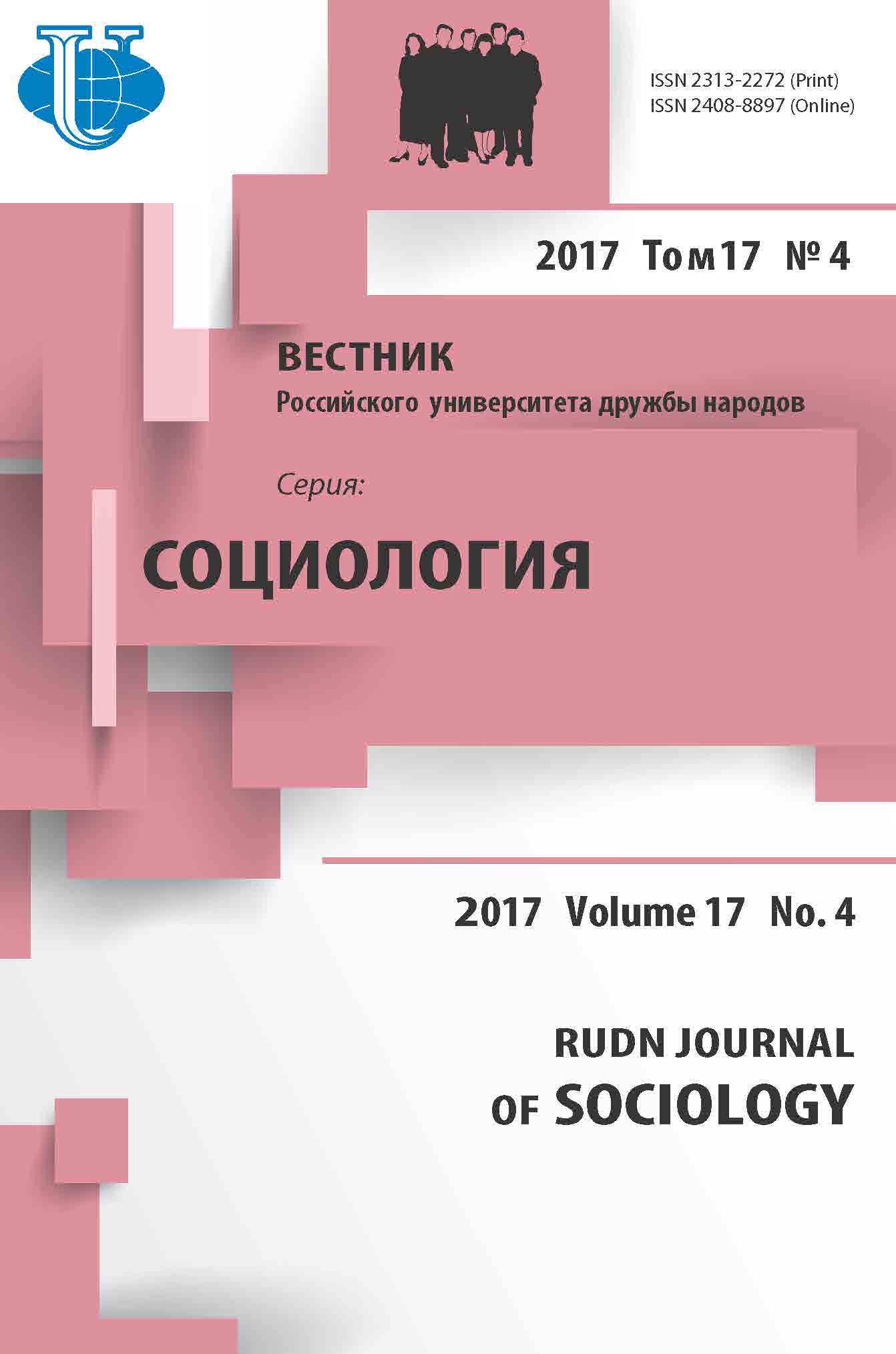CROSS-CULTURAL EXPERIMENTS AS AN ADAPTATION STRATEGY
- Authors: Podoynitsyna II1, Petrov SG1, Fedorova AA1, Yakovlev PI1
-
Affiliations:
- M.K. Ammosov North-Eastern Federal University
- Issue: Vol 17, No 4 (2017)
- Pages: 578-591
- Section: Surveys, experiments, case studies
- URL: https://journals.rudn.ru/sociology/article/view/17298
- DOI: https://doi.org/10.22363/2313-2272-2017-17-4-578-591
- ID: 17298
Cite item
Full Text
Abstract
The article considers methodological and empirical aspects of cross-cultural communica-tions under the economic and cultural globalization that determined the free movement of labor migrants around the world though this process is accompanied by certain difficulties. The authors believe that even a theoretically prepared person that knows about the influence of cultural differences on the organizational management in different countries will experience a cultural shock when working abroad. The cultural shock is a discomfort, frustration and even depression caused by getting into an unfamiliar environment. At the applied level, the authors analyze the so-called ‘cross-cultural experiments’ - attempts of an individual (a working specialist of a certain nation) to test one’s strength, skills, and professional competencies in a foreign company. The authors’ sociological study of a cultural benchmarking type consisted of two stages. At the first stage, foreigners working in the capital of the Republic of Sakha (Yakutia) were inter-viewed; at the second stage, the Russians working abroad, mainly in the USA, were interviewed. The migra-tion flows from China have recently intensified in Yakutia, but the overwhelming majority of labor migrants are still from West and Central Asia, mainly from Tajikistan, Kyrgyzstan, and Armenia. The foreigners working in Yakutia and Russians working abroad experience same difficulties of adaptation in a new col-lective. Friends, relatives, members of the ethnic community, but not specially trained cross-cultural coaches and mentors, help them with adaptation. Such a personnel technology as selection, recruitment and headhunt-ing works reasonably well, while other HR technologies of cross-cultural management (motivation, feedback, etc.) are still lagging behind. The authors insist on introducing courses on cross-cultural adaptation in interna-tional groups both in Russia and abroad together with a system of the so-called ‘budding’.
About the authors
I I Podoynitsyna
M.K. Ammosov North-Eastern Federal University
Author for correspondence.
Email: irena_ivan@mail.ru
Prosp. Lenina 1, Yakutsk, Republic of Sakha (Yakutia), Russia, 677000
S G Petrov
M.K. Ammosov North-Eastern Federal University
Email: st27petrov@mail.ru
Prosp. Lenina 1, Yakutsk, Republic of Sakha (Yakutia), Russia, 677000
A A Fedorova
M.K. Ammosov North-Eastern Federal University
Email: f_aigy_sher@mail.ru
Prosp. Lenina 1, Yakutsk, Republic of Sakha (Yakutia), Russia, 677000
P I Yakovlev
M.K. Ammosov North-Eastern Federal University
Email: pyakovlev14@gmail.com
Prosp. Lenina 1, Yakutsk, Republic of Sakha (Yakutia), Russia, 677000
References
- Grazhdanskoe obshhestvo v epohu globalizacii [Civil Society in the Era of Globalization]. Pod red. I.I. Podoynitsynoj. SPb.: izd-vo SPbUTUiJe; 2017 (In Russ.).
- Gumilev L.N. Etnogenez i biosfera Zemli [Ethnogenesis and the Biosphere of the Earth]. Leningrad: Gidrometeoizdat; 1990 (In Russ.).
- Kostina I.A., Hozhempo V.V. Upravlenie kross-kul'turnoj adaptaciej v mezhdunarodnom biznese [Managing cross-cultural adaptation in the international business]. www/cyberleninka.ru/article/ n/upravlenie-kross-kulturnoy-adaptasiey-v-mezhdunarodnom-biznese (In Russ.).
- Myasoedov S.P., Borisova L.G. Kross-kulturnyj menedzhment [Cross-Cultural Management]. Moscow: Yurayt; 2015 (In Russ.).
- Myasoedov S.P. Osnovy kross-kulturnogo menedzhmenta. Kak vesti biznes s predstaviteljami drugih stran i kultur [Cross-Cultural Management Fundamentals. How to Conduct Business with Representatives of Other Countries and Cultures]. Moscow: Delo; 2003 (In Russ.).
- Otdelnye pokazateli migracionnoj situacii v Rossijskoj Federacii za janvar-dekabr 2016 goda [Some indicators of migration in the Russian Federation in January-December 2016]. mvd.ru (In Russ.).
- Podoynitsyna I.I. Etnokulturnye aspekty razdelenija truda v sovremennoj Yakutii [Ethniccultural aspects of the division of labor in today’s Yakutia]. Vestnik SPbGU. Serija 12. 2012; 3 (In Russ.).
- Razvitie kadrovogo menedzhmenta v organizacijah sovremennoj Yakutii [Development of Personnel Management in Today’s Yakutia Organizations]. Pod red. I.I. Podoynitsynoy. Saint Petersburg: izd-vo SAU; 2016 (In Russ.).
- Rost chisla migrantov v Rossii vyshel na dokrizisnyj uroven [The number of migrants in Russia reached the pre-crisis level]. www.rbc.ru/ politics/06/12/2016/5816 (In Russ.).
- Toegel G., Barsoi J.-L. Situacii, kogda mezhkulturnaja kommunikacija ruhnet [Situations when intercultural communication will collapse]. Harvard Business Review. April 2014.
- Blanchard K., Lorber R. Putting the One Minute Manager to Work. New York: HarperCollins Publishers; 1984.
- Dholakiya P. 3 tips for managing a cross-cultural workforces. www.entrepreneur.com/ amphtml/288796.
- Welty R. Thai Culture and Society. Bangkok: Asia Books; 2012.
Supplementary files













